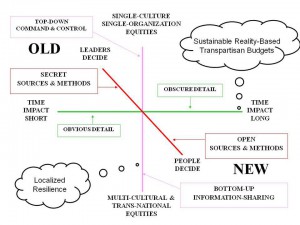
Dear friends,
This is the first of a series of postings I'll do about the sources of the Occupy movement, from a number of angles. Each mailing will cover one or two of them. They are, of course, not definitive or complete, but I find them all intriguing. Some of them have been touched on in – and are augmented by – previous posts.
The Occupy movement seems to have come “from nowhere”, appeared “out of the blue”. But a lot of events, people, writings, social movements and social conditions developed over extended periods of time and combined to trigger its emergence at this time.
Since our society is what scientists call “a complex living system”, it embodies the principles of complexity science. One of those principles is that, while we can IN RETROSPECT often identify chains of causation leading up to some event in a complex system, the web of causation is actually so complex and dense with interdependencies and feedback loops that we cannot PREDICT that event ahead of time. We can estimate the probabilities of it happening, but we have no way of knowing exactly what is going to happen. And sometimes with such events, we just didn't see it coming at all!
So I'm looking at the emergence of Occupy in retrospect and will be offering factors – new ones in each mailing – that seem to lead up to it because it helps me to understand it, respond to it, participate in it. But I have no illusions that it will tell me or anyone else what will happen next.
For that, we have to step into the flow. Our roles in such complex living systems are not so much to predict (as spectators) but to co-createe (as participants). How consciously do we want to do THAT?
Coheartedly,
Tom
*** CONSIDERING ANARCHIST IDEAS AND MOVEMENTS ***
Occupy Wall Street's anarchist roots
by David Graeber
Excerpts:
The easiest way to explain anarchism is to say that it is a political movement that aims to bring about a genuinely free society – that is, one where humans only enter those kinds of relations with one another that would not have to be enforced by the constant threat of violence. History has shown that vast inequalities of wealth, institutions like slavery, debt peonage or wage labour, can only exist if backed up by armies, prisons, and police. Anarchists wish to see human relations that would not have to be backed up by armies, prisons and police. Anarchism envisions a society based on equality and solidarity, which could exist solely on the free consent of participants….
How, then, did OWS embody anarchist principles? It might be helpful to go over this point by point:
Continue reading “Tom Atlee: Source of the Occupy Movement Part I”


